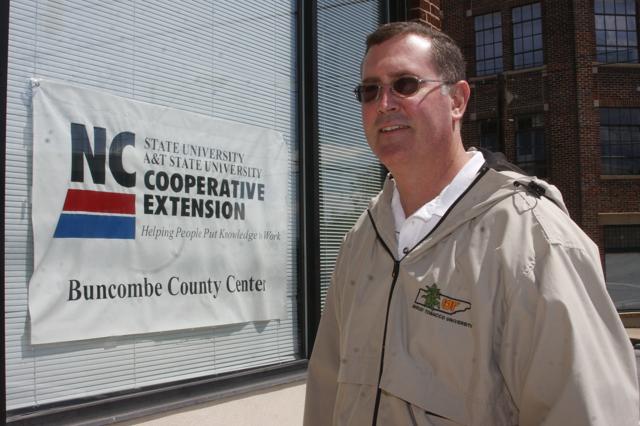Pending major budget cuts could limit the ability of the N.C. Cooperative Extension — and its Buncombe County office — to provide important services.
The agency, an affiliate of N.C. State and N.C. A&T universities, learned last month that legislators were considering slashing its approximately $42 million in state funding by as much as 30 percent. That would have resulted in some 300 to 400 layoffs statewide and a drastic reduction in programs, which "run a good gamut, from helping farmers with advice on soil fertility and plants and farm management all the way to 4H youth development and helping homemakers and families with parenting skills and nutrition," Buncombe County Extension Director Steve Duckett explains.
More recently, as the Legislature has continued to crunch the budget numbers, Duckett says he's been told to expect cuts closer to 15 percent (roughly $6.3 million), thanks to an outpouring of support.
"A lot of clientele that use the Extension throughout the state have been voicing their opinions to the legislative delegation and asking them to moderate reductions," he reports. And though the specific impact on the local agency isn’t clear at this point, Duckett worries that the cuts could hurt their efforts to "bring the research of the university out to local farms.
"We're one of the connectors and drivers of progress," he adds, stressing agriculture’s vital importance to the local economy. The local extension service office estimates Buncombe County’s 2009 agricultural income at $65.5 million, with greenhouse/nursery plants, beef cattle and milk the leading money generators. All told, the county’s 1,077 farms contain 72,087 acres of farmland, the office notes.
Preserving those farms is a "top priority" for the Buncombe County Board of Commissioners, notes board Chair David Gantt, offering enthusiastic praise for the agency’s programs.
"There's a lot of really good energy going on that the agricultural extension has helped generate — all towards the end of increasing farming and farming possibilities in Buncombe County," he observes. "We're a big fan, and we want to see the program funded as far as we can."
Gantt, a Democrat, has harsh words for Republican leaders in the Legislature who have pledged to let a 1 percent state sales tax expire June 30. That, says Gantt, accounts for much of the state’s budget shortfall and the resulting funding cuts.
"That tax needs to be continued so that we can keep these programs and not have the horrible cuts that are being proposed for the agricultural extension and education and all the other programs that make North Carolina a great state to live in," he asserts. "It's just a shame, when a program works so well, to cut it off for rich North Carolinians to keep more money."
Asked about the tax, Republican Rep. Tim Moffitt said:
"The state doesn't really have a revenue problem as much as a spending problem.” The Legislature, he continued, has “a responsibility to identify the core functions of government and really bring government back to what those core functions are … getting out of the areas that government has unfortunately wandered into over the years."
Sen. Tom Apodaca, a Republican who serves on the committee responsible for drafting the Extension's budget, did not respond to several requests for comment.
Preserving the tax would put an additional $1.1 billion in state coffers, Buncombe County Manager Wanda Greene reports. Gov. Bev Perdue had proposed whittling it down to 0.75 percent, which Greene says would still have generated about $827 million annually. It's hard to say what the Cooperative Extension’s share of that money might have been.
Local staff positions, programs at risk
Meanwhile, the county is grappling with its own budget crunch, and despite Gantt's enthusiasm, the Cooperative Extension office — which is in line for the same 7- to 10-percent cut all county departments are facing — must still take a back seat to the most essential budget items.
"It's a priority, but it's not a core service," he explains. "Core services are education, law enforcement and welfare. We're going to have to juggle it, but I suspect our board would give it some great weight and do our best to fully fund it."
The local Extension office receives roughly 49 percent of its funding from the county (about $476,000 during the current fiscal year, which ends June 30) and 51 percent from the state. The county’s 2011-12 budget is still being tweaked, but the most recent draft allocates $431,554 for the agency, Greene reports.
"Most likely that will result in the loss of our agricultural technician position and one secretarial position," Duckett reveals. "This will mean agents and clients will have less program-and-project support, which they will have to pick up. This in turn will reduce the numbers and variety of programs that can be offered."
The office currently employs six full-time agents who work exclusively in Buncombe County and two more who are shared with other counties. For now, Duckett says they're trying not to let the budget uncertainty and the threat to job security get them down.
"It's a source of anxiety," he acknowledges. "But we're just trying to get our jobs done day to day and have a positive outlook."
— Jake Frankel can be reached at 251-1333, ext. 115, or at jfrankel@mountainx.com.



Before you comment
The comments section is here to provide a platform for civil dialogue on the issues we face together as a local community. Xpress is committed to offering this platform for all voices, but when the tone of the discussion gets nasty or strays off topic, we believe many people choose not to participate. Xpress editors are determined to moderate comments to ensure a constructive interchange is maintained. All comments judged not to be in keeping with the spirit of civil discourse will be removed and repeat violators will be banned. See here for our terms of service. Thank you for being part of this effort to promote respectful discussion.